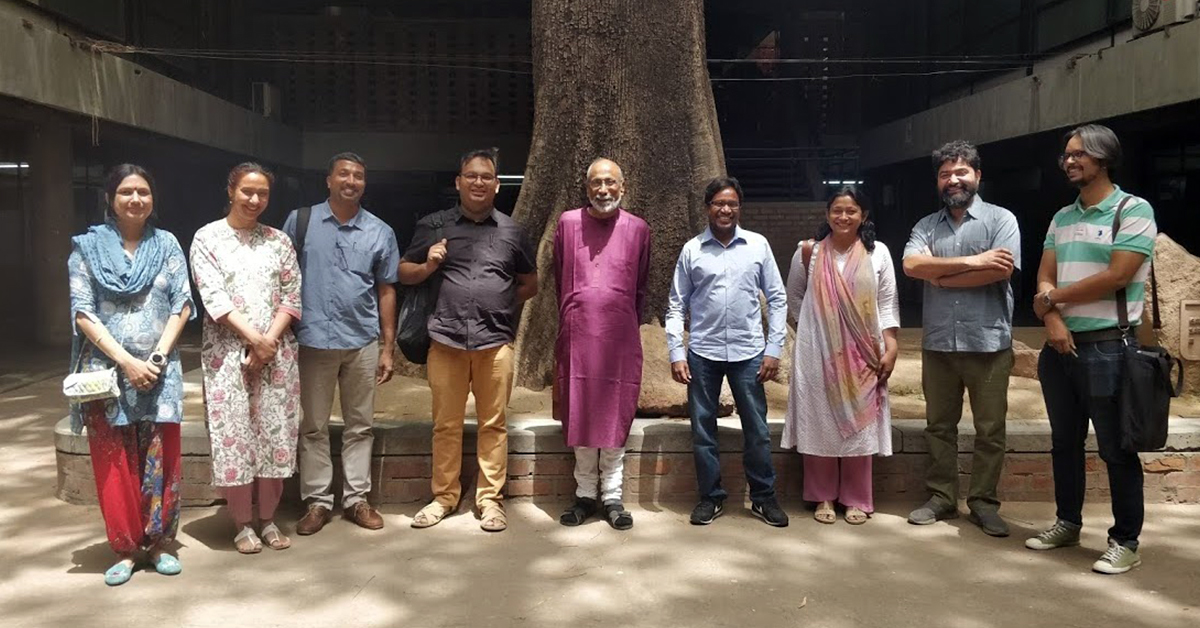Design is the professional capability of creating and developing context-led concepts and translating them into tangible solutions for the benefit of people, society, industry and the environment. The design of objects, communication, services, interface and their systems requires in-depth analysis and the creative synthesis of information and ideas based on a variety of disciplines and experiences. Design thinking brings together the finest sensibilities of the arts, the logic of science and the functional pursuits of technology in an innovative framework.
At the heart of all of NID's academic programmes and activities are the values of ‘learning by doing’ and ‘learning from the field’. The curriculum and pedagogy offered at the Institute have uniquely evolved from a value based interdisciplinary approach to creative problem solving wherein research is integral to the process of design.
A Doctor of Philosophy (PhD) degree in Design shall be awarded for a period of advanced study that culminates with the design of an innovative solution/approach/method/interface for a product/ communication/service/experience along with an accompanying thesis that extends the body of knowledge and the application of design thinking, process and practice.
The programme shall be open to educators and professionals in design and allied fields who wish to reinvent their own practice or knowledge base while pushing the boundaries of the discipline through innovation in practice and create new design theories. The PhD programme at NID is benchmarked to a level comparable to doctoral research in design at reputed institutions in the field, both abroad and in India.
Read MoreDisciplines
The PhD programme in Design shall include the following priority areas this year: Design Education (e.g., pedagogy, design for schools), Design Innovation (e.g., in Railways), Social Innovation (e.g., crafts and culture), and Design Practice.
The PhD programme in Design will include:
- Original investigation undertaken through a design project, in order to gain new knowledge by means of practice and the outcomes of that practice. Claims of originality and contribution to knowledge may be demonstrated through creative outcomes, which may include artefacts such as objects, images, film, fashion, music, design collections, models, samples, prototypes, digital media or other outcomes such as performances and exhibitions. Doctoral submissions for this kind of research must include a contextualisation of the creative work. A written/video thesis will form a part of the dissertation,which shall be in a dialogic and analytic relation to the outcome, with a suitable articulation of the objective, methods, process and findings.
- The research may also be concerned with the nature of practice and lead to new knowledge that has operational significance for that practice. The main focus of this kind of research shall be to advance knowledge about practice or to advance knowledge within practice. The results of the research, in this case, may be fully described in text form in the doctoral thesis.
The programme shall promote the accumulation and application of diverse research methods that should be customised as per Indian variables and the context of Indian socio-cultural heritage and should be relevant to the needs of the country. The main emphasis of the programme will be the generation of new knowledge through testing and implementing new materials, techniques, processes and design ideas. The programme will nurture design thinking as an inquiry-based field of research and knowledge production that, in turn, inform better design practices.
Curriculum Objectives
The PhD programme in Design aims to promote deep reflection, inquiry, and rigor in the development and dissemination of new ideas, expressions and skills in the field of design and allied fields and shall lead to their meaningful manifestations in the form of new design collections, objects, communication, services, strategies, etc. The work shall contribute new theories and knowledge to design, design education and design practice.
The purpose of the programme is to support the creation of products or services that improve the quality of life of people, meet demands to sustain the environment, improve policymaking; and better the understanding and use of design in industry, education and society at large.
Objectives
To foster original research and create new knowledge about the nature and practice of design.
To engage in a deeperunderstanding of expressions, methods and the role of design in problem solving activity.
To foster NID’s pedagogic principlesof ‘Learning to Know’and ‘Learning to Do’alongside itscore ideals and culture.
To enable collaboration in research, scholarship, design development and service.
To enable students to engage in advanced research and practice with design theorists and practitioners in a broad varietyof fields.
To contribute towards the Institute’s objective of design for dignity and service to society, and to participate in meaningful design for change and sustainability.
How to Apply
Admission to all programmes at NID is on the basic of the candidates' performence in two stage of design aptitute test. the objective of these exam is to assess the knowledge , skills and behaviourral abilitites of camdidate please access admissions.nid.edu for applly online.
Apply Now

